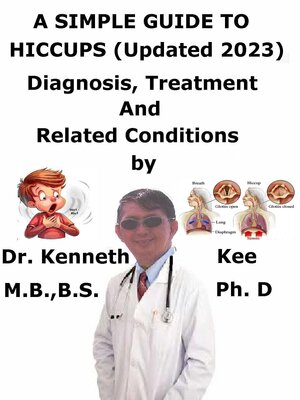A Simple Guide to Hiccups (Updated 2023), Diagnosis, Treatment and Related Conditions
ebook
By Kenneth Kee

Sign up to save your library
With an OverDrive account, you can save your favorite libraries for at-a-glance information about availability. Find out more about OverDrive accounts.
Find this title in Libby, the library reading app by OverDrive.



Search for a digital library with this title
Title found at these libraries:
| Library Name | Distance |
|---|---|
| Loading... |
This book describes Hiccups, Diagnosis and Treatment and Related Diseases which is seen in some of my patients in my Family Clinic
How I wish the hiccups would go away
But the hiccups just seem to want to stay
Stick out the tongue and bite the lip.
Hold the breath and shake the hip,
Maybe a person could swallow air
Or maybe try to eat acid like pear
Maybe the person could scare them out
The person could scream or maybe shout
Maybe the person could jump up and down
Or try not to breathe or make a sound
Pull back the left foot and kick up.
Now that seems to cure the hiccup
Chlorpromazine or haloperidols are medicines
To relax the diaphragm and stop it moving
Take anti gastric medicines such as omeprazole or ranitidine
In most cases the hiccups can be treated with medicine
-An original poem by Kenneth Kee 2014
(Chapter from A Simple Guide to Hiccups 2014 by Kenneth Kee)
One time is funny, two times is hilarious, and anything more than that is normally just irritating.
People all had them, but does the person actually know where they come from?
They are hiccups, and they are the strange little sounds that can escape from the mouth without warning.
Hiccups start much lower in the body, though — in the diaphragm, the dome-shaped muscle between the lungs and stomach.
Normally, the diaphragm pulls down when the person inhale to let air into the lungs, and then relaxes when the person exhale so air can flow back out of the lungs to exit the nose and mouth.
If there is irritation of the diaphragm, the diaphragm may spasm forcing the person to suddenly suck air into the throat, where it knocks the voice box.
That induces the vocal cords to suddenly shut, generating the distinct "hic!" sound.
Charles Osborne had an unusual manner of speaking designed to conceal the sound of his constant hiccupping. He'd had plenty of practice: Ever since an accident on June 13, 1922, Osborne had hiccupped nonstop. The condition persisted for more than six decades, only ending in 1990, a full 68 years after it began. Osborne's plight remains the longest attack of hiccups confirmed by Guinness World Records.
For reasons unknown, Osborne's hiccups suddenly stopped in 1990. He died around a year later, in May 1991, after what must have been a blissfully hiccup-free few months.
I have a patient who is a Chinese teacher who writes stories about his teaching days in Malaysia.
He spends most of his time sitting in a chair to write his stories.
According to his wife and family he has been having hiccups on and off for at least 10 years.
He is given Chlorpromazine with good effect to stop the hiccups. However it causes a bit of drowsiness. I placed him on librax which is a cholinergic medicine and antacid for gastric acidity which appear to help without drowsiness.
As far as I know he is still taking these medicines to control his hiccups.
Brief bouts of hiccups which often cause annoyance in patients are a frequent part of life.
Persistent bouts are a more serious disorder and have been linked with considerable disease and even death.
The term hiccup comes from the sound of the event.
The medical term for hiccups is singultus.
Hiccups are caused by a sudden involuntary contraction of the diaphragm.
The spasm is followed by quick closing of the vocal cords which produces a distinctive hic sound.
Dissimilar to other reflexes such as coughing, hiccups do not appear to have any useful function.
Hiccups often start and normally disappear after a few minutes.
TABLE OF CONTENT







